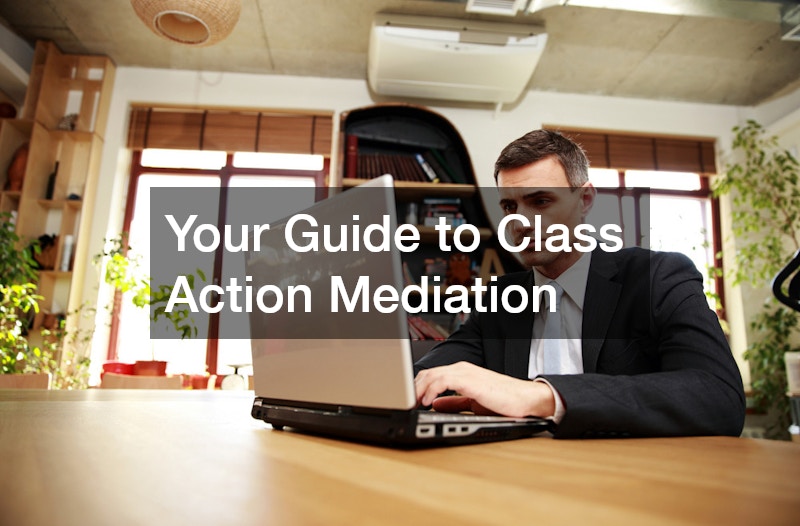
Class action mediation is a critical process in resolving legal disputes involving multiple plaintiffs. It aims to find a mutually agreeable resolution between parties without the need for a prolonged court battle. This process is facilitated by a neutral third-party—often a professional mediator—who helps guide discussions towards a settlement.
The key benefit of class action mediation is that it can significantly reduce the time and costs associated with litigation. Plaintiffs and defendants alike may prefer mediation as it offers a more flexible and private forum to address their grievances. Moreover, it aids in achieving an amicable settlement that is satisfactory to all parties involved.
A class action mediation session typically involves representatives from each side presenting their perspectives. The mediator then works to foster communication and negotiate terms that are acceptable to both parties. While the mediator does not offer legal advice, they do provide valuable insights and solutions to help bridge gaps between litigants.
The Process of Class Action Mediation
The class action mediation process usually begins with the selection of a mediator agreed upon by both parties. This mediator, who is experienced in handling such complex disputes, will oversee the mediation sessions. Prior to meeting, both parties often submit confidential statements outlining their issues and desired outcomes.
During the mediation session, the mediator sets the ground rules and guides the conversation to ensure a respectful exchange of information. Both parties have the opportunity to speak individually and collectively, allowing them to express their views and concerns. The mediator facilitates discussions, encouraging creative problem-solving to reach a consensus.
If an agreement is reached, it’s typically documented in a settlement agreement, which is then reviewed by the attorneys involved. This document ensures that all parties are clear about their obligations and the terms of the settlement. Ultimately, the goal of the mediation is to avoid the unpredictability and adversarial nature of courtroom proceedings.
Benefits of Opting for Class Action Mediation
One of the primary benefits of class action mediation is the potential for a swifter resolution. Courtroom battles can drag on for years, often resulting in significant financial and emotional costs for those involved. Mediation allows for a more streamlined approach, facilitating quicker settlements and reducing the overall burden on the judicial system.
Additionally, class action mediation offers privacy and confidentiality, which might not be possible in a public court case. The details of negotiation and settlement remain private, allowing parties to maintain discretion. This aspect can be particularly appealing to corporations concerned about reputation and to individuals seeking personal privacy.
Lastly, mediation provides a more collaborative environment compared to traditional litigation. Parties are encouraged to work together towards a resolution, often improving relationships and understanding. By fostering mutual respect and communication, mediation can lead to sustainable solutions that are more likely to satisfy all parties involved.
Challenges and Considerations in Class Action Mediation
While mediation offers numerous benefits, it does present some challenges that parties need to consider. One primary challenge is that it relies heavily on the willingness of both parties to negotiate in good faith. If one party is uncooperative or unwilling to compromise, reaching a settlement can be difficult.
Another consideration is the potential imbalance of power between the parties involved. In some cases, defendants might possess more resources or negotiating clout, which can influence the outcome of mediation. It’s crucial that mediators address these discrepancies to ensure a fair process.
Finally, not all disputes may be suitable for mediation. Cases involving non-negotiable legal rights or significant public interest might require a judicial decision. Despite these challenges, mediation remains an effective tool for resolving many class action disputes amicably.
The Future of Class Action Mediation
As legal systems worldwide evolve, class action mediation is poised to play an even larger role in dispute resolution. Its ability to reduce court congestion and offer timely settlements is becoming increasingly attractive. Moreover, advancements in technology are making virtual mediation an option, providing even greater flexibility for parties involved.
Organizations and legal professionals are recognizing the value of mediation training to better prepare for such negotiations. This focus on honing mediation skills can lead to more efficient and successful resolution processes. Furthermore, incorporating AI tools and data analysis might enhance the insights provided during mediation, leading to better outcomes.
Ultimately, as more parties experience the benefits of class action mediation, its prevalence is likely to increase. By offering a humane and efficient approach to conflict resolution, mediation is set to become a cornerstone of modern legal practice. Its future looks promising, paving the way for more collaborative and less adversarial legal processes.
.





